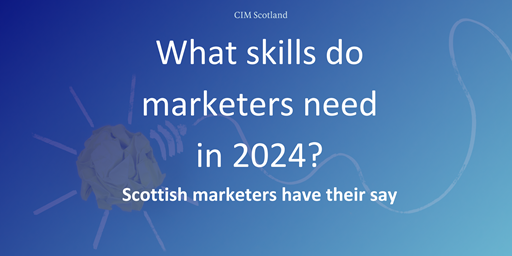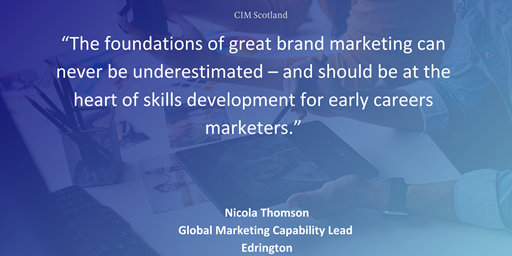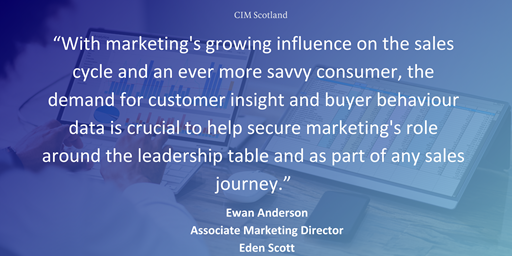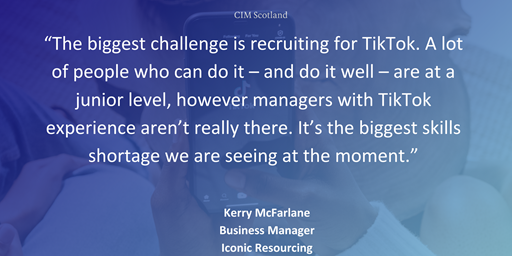What skills do marketers most need in 2024?
In the fourth article in our 2024cast series, we asked Scottish marketers what skills they think are most needed in marketing right now, and if there were any particular skills gaps. Marketers from Iconic Resourcing, Edrington, Frame, Eden Scott, Thermo Fisher Scientific and more share their thoughts.

Strategy
The importance of being strategic in marketing is something many marketers felt passionate about. This is not just for those who work in a strategy department, but something important for all marketers whose role needs them to work towards achieving business goals (so, er, all of them!).
Strategic skills are something all marketers need, said Graham Milne, Owner at Spiritmedia, adding: “Far too much weight given to the false profit (see what I did there?) that is ‘performance marketing’.”
And these strategic skills go further than just knowing how to create a SWOT analysis or understanding Porters 5 Forces, although those elements are useful. It goes about using the information you have to implement a better way of working.
For Ewan MacGill, Associate Director at Frame, “the ability to seek and strategically apply perspective outside of your own to the work is the most important skill a marketer can possess.”
If you’re interested in upping your strategy skills, the CIM has a range of courses from Introduction to Strategic Marketing, through to a Neuromarketing Masterclass.

Brand marketing
Brand marketing is essential for any company. Just in case you don’t know, it’s the strategic effort a company makes to create and promote a unique identity and image for its products or services in the minds of consumers: covering the logo, messaging, overall experience etc. It goes beyond just advertising and focuses on shaping how people perceive and connect with a brand.
Nailing your brand marketing is so important because it helps you to differentiate your brand from competitors, builds credibility, allows you to showcase your values and more.
“The foundations of great brand marketing can never be underestimated – and should be at the heart of skills development for early careers marketers. Marketers need to be more commercially aware and astute and developing skills in this area will be key to developing effective marketers of the future,” said Nicola Thomson, Global Marketing Capability Lead at Edrington.
She should know: spirits company Edrington have a stable of premium alcohol brands, from The Macallan to Highland Park to Brugal.
Kerry McFarlane, Business Manager at Iconic Resourcing, believes that this goes a step further. As a recruiter, she has noticed that there has been a shift in how brand manager roles have been advertised and what companies are looking for over the past few years: “It’s now more focused on realignment and less about launch. Companies are looking more to rebrand and redefine their current offering than creating something new: it’s about making it more user friendly and streamlining journeys.”
While brands are still launching new product, this changing focus in what companies are specifying in their job ads shows that their perspective is changing in a post-pandemic, tighter-budget world. This means that being able to get to grips with brand marketing is even more essential.
Agility
The ability to be agile in marketing is becoming more important. Things move so fast: whether it is jumping on a social media trend, adapting based on customer feedback, or testing new technology, being agile can have a real competitive advantage for your business.
Craig Graham, Regional Marketing Manager at Thermo Fisher Scientific, agrees. He said: “The marketing landscape is ever-changing, especially with the continuous advancement of technology and the opportunities it brings. One of the key skills for current and future marketers is being agile. While classic skills such as curiosity, storytelling, communication, and customer focus will continue to be paramount, I do believe the role of marketing will become even more challenging. A marketer’s ability to be agile will become increasingly important, by reacting and responding to the advancing technology and staying up to date with vital changes in our fast-moving industry.”
Unlike some of the other skills listed in their article, agility isn’t one it’s easy to learn in a course: it comes more from doing. In fact, if you search ‘agility courses’ you’ll me more likely to receive a lot of ads on how to train a dog.
Becoming a more agile marketer comes from fostering a culture of continuous learning and improvement in your marketing team: encouraging people to be open to new ideas; testing and learning to see what works (and using the insights to improve); and staying up-to-date with industry trends, emerging technologies, and shifts in consumer behaviour so you can spot anything that may be of interest.
Using marketing automation and project management tools and methodologies such as Scrum or Kanban can also play a role.

Data analysis
The ability to get to the heart of data and convert this into something meaningful can play a huge role in being agile.
But Ewan Anderson, Associate Marketing Director at Eden Scott, feels this skill is somewhat underutilised at the moment: “At a leadership level, there remains a need for more knowledge around data science and analysis and a persistent strategic gap between sales and marketing. With marketing's growing influence on the sales cycle and an ever more savvy consumer, the demand for customer insight and buyer behaviour data is crucial to help secure marketing's role around the leadership table and as part of any sales journey. This level of understanding requires marketing leaders to fully grasp the data and its relevance.
“At a technical level, there is a similar demand for data science skills, a deeper understanding of automation and the implementation of AI-driven marketing solutions.”
While companies are for the most part tracking this data, it’s making sure that it is converted into something meaningful. CIM Scotland hosted a webinar in 2023 about how insights can be used for marketing.
“Emotional intelligence is what’s needed more and more, especially with the increase in data and insights so readily available, and AI technologies in the mix. Marketing to humans requires the humans who create the marketing approaches to consider uniquely human emotional responses – I do see a skills gap here,” added Sarah Wildman-King, Founder at Wonderworks Communications.
Retention: internal communications and client retention
As her job as a recruiter, Kerry McFarlane, Business Manager at Iconic Resourcing, noted that there has been an increase in roles that have a focus on retention, with about a third of roles that her company has placed focusing on retaining staff and customers: “It’s about looking after what they have.”
It’s a well-stated fact that it is cheaper to keep a customer than to attract a new one, and companies are putting an effort on this; as can be seen by the importance of brand management.
“CRM, customer journeys and membership are key areas around consumer loyalty, driving initiatives that lead to repeat custom and retention,” Kerry stated. Understanding customer loyalty platforms and how to use CRM systems can be a huge bonus for this, for marketers looking to apply for one of these roles.
But the retention isn’t just for customers: there is also a rise in internal communications roles. Being able to engage with staff and keep them up to date, enthused and ‘bought-in’ to what is happening is essential, and it’s being taken more seriously. While internal communication roles are seen as sitting more within the HR team, it truly relies on marketing skills to engage with employees.

TikTok
Social media is a huge growth area, and it should not come as a surprise that more and more social media job ads are calling out content creation, such as TikTok.
However Kerry McFarlane, Business Manager at Iconic Resourcing, has noted that the skills gap isn’t coming from those at a junior level, it’s those more senior social media marketers: “The biggest challenge is recruiting for TikTok. A lot of people who can do it – and do it well – are at a junior level, however managers with TikTok experience aren’t really there. It’s the biggest skills shortage we are seeing at the moment.”
While brands like Duolingo show that it can be more junior members of team (by both age and experience) that can take TikTok to the next level, companies are looking for managers who can confidently build TikTok strategies and lead full teams, and there is a deficit of these right now in Scotland. If a few years, we’ll no doubt see the content creators who have so passionately been using TikTok take over this space, but at the moment it is an area of opportunity for those mid-level marketers with TikTok experience to step up.
General marketing
Finally, there is becoming more of an anticipation that marketers will be a jack of all trade and have at least a basic understanding of most areas of marketing.
Said Ewan Anderson, Associate Marketing Director at Eden Scott: “The challenging economic situation is driving an expectation for general, in-house marketers to have a broader understanding of most marketing tactics and the ability to successfully implement them instead of building a team of specialists.”
Kerry McFarlane, Business Manager at Iconic Resourcing, agreed, saying that she is seeing a bit more of a generalist focus in-house, while the companies rely on agencies for specialist skills such as PPC.
But is this generalist marketing approach something that new marketers – or even experienced marketers – have? Frank Gormanley, Founder at Forever Great, suggested that more needs to be done to upskill marketers to hold the range of skills needed…and that this starts from education.
“There is an expectation that marketers cover a plethora of areas - strategy, campaign implementation, digital, data, designs, creativity and, yeah, the list goes on! More businesses are seeking marketers with a mixed skill set and knowledge base that touches all, or at least several core aspects.
“I will always beat the drum that academia needs to be more aligned with the business community to ascertain the requirements for the future workforce. Students from both college and university institutions need to be better equipped with the marketing clout businesses seek - theory is important, but the practical elements more so.”
So, what does this means for marketers – and hiring managers – in Scotland? Whether you are considering looking for a new role, or looking to upskill your staff, there are a lot of resources that can help you to learn and tap into these skills. CIM’s training courses are a great place to start (and don’t forget members get a 15% discount), but there are also a wide range of podcasts, videos, blogs and more to help build your skills.
Want to see what marketing skills are needed in your industry? Every year the CIM shares their digital marketing skills benchmarking report, which shows where there is growth and where there are gaps.

